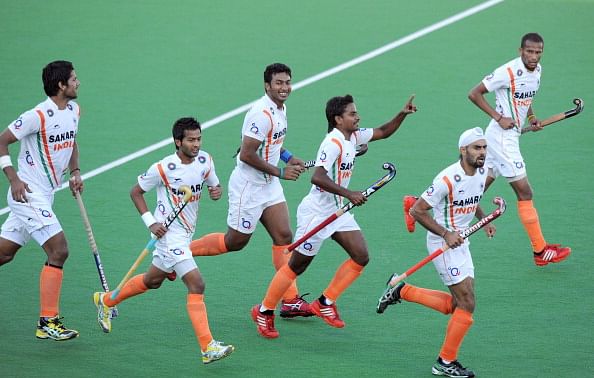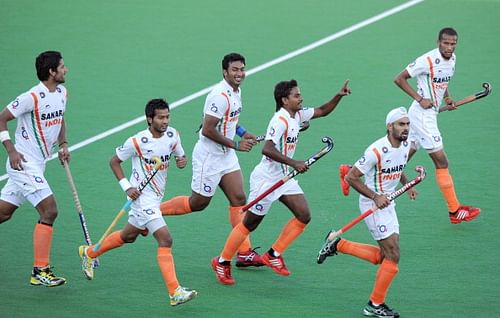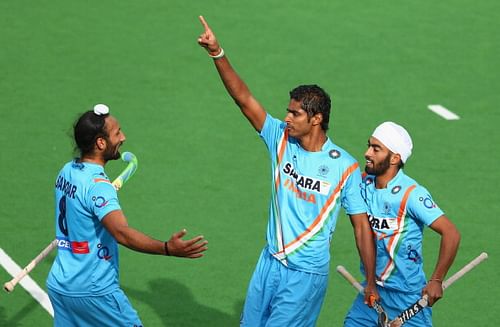
Indian hockey: Spirited Champions Trophy performance triggers a new beginning
A pall of gloom descended on Indian hockey after their worst-ever performance at the Olympics last August. The sport was driven to such levels of despair in the country that hockey fans found it exceedingly difficult to see a rebound in our fortunes.
The 34th FIH Champions Trophy in Melbourne was seen as just another tournament where the team was taking part to make up the numbers, rather than causing any serious dents to the fortunes of the big teams.
But the State Netball and Hockey Centre – the venue of the elite tournament – saw an Indian team which was refreshingly different from the battered and struggling London Olympics side.

A team replete with young legs, the Sardar Singh-led side had to make a beginning somewhere, and the Champions Trophy was just the right platform to make a statement, which would arrest the dipping interest and popularity of the sport in India.
Of course, the team benefited from the fact that there were not much expectations to deliver, given the sagging morale of the team after the Olympics disaster and also this being India’s first tournament after the London games.
Chief coach Michael Nobbs had gone on record on the eve of the tournament, saying that he was going into the tournament without any expectations.
Probably, this ‘no expectation’ element had a big say in India’s performance in the tournament; the boys played more freely without the fear of losing and that helped in a big way as the blue shirts tried their best to write the revival chapter for Indian hockey.
Indian defence – the most criticized area of Indian hockey – put up a show which deserves lavish praise. Spearheaded by 34-year-old goalkeeper PT Rao, the Indian defence stood tall amid numerous opposition forays and came out on top on a consistent basis.
Rao, who made his international debut against England, capped off a superb tournament, effecting crucial saves in every match. If Rao was good at defying the opposition goal scoring opportunities from fast counter-attacks, he was also at ease nipping crosses from both flanks in the bud.
What’s more, he was outstanding during penalty corner situations. If he was in red hot form against New Zealand and Belgium, denying goals from PCs, he brought out his best against Australia against whom India lost 0-3 in the semifinal.
It was Rao’s brilliance at the goal-line that prevented Australia from scripting a big win. The manner in which the Aussies attacked in waves during the entire course of the match, India would have easily conceded seven-eight goals if Rao had not stood like a rock at the back.
The fact that Rao was supposed to be an understudy to regular goalkeeper PR Sreejesh for the Champions Trophy, and played in the premier tourney only because Sreejesh suffered a hamstring injury and was ruled out of the event, makes his achievement all the more remarkable.
Rao was ably complemented by the likes of Vokkaliga Raghunath, Rupinder Pal Singh and Manpreet Singh.
Raghunath shouldered more responsibility after his elevation as the team’s new vice captain. He has earned all his hockey fame for his power-packed drag-flicks but the 2012 Champions Trophy saw the emergence of Raghunath as a defender.
The way the burly fullback dispossessed opposition strikers with timely tackles is indeed heartening for Indian hockey.
Rupinder Pal Singh – another talented drag-flicker – also dished out a robust performance at the back in the absence of experienced guys like Sandeep Singh and Ignace Tirkey. Both Raghunath and Rupinder were also able to outsmart rival players with their mascular physique.
Manpreet Singh may not be as heavily built as Raghunath or Rupinder, but he turned in a stout display to announce himself as one of the mainstays of India’s defence. His way of throwing his body behind the ball drew copious praise from various quarters.

Captain Sardar Singh manned the midfield with aplomb, never missing out on an opportunity to rescue the defence or make overlapping runs upfront.
The likes of Kothajit Singh and Birendra Lakra performed the support cast roles near perfectly. Rookie Gurmail Singh looked promising as well.
The trapping and ball distribution of our midfielders was much better than what one saw at the London Olympics.
Although there is enough room for improvement in this area, the fact that corrective measures have been undertaken to address this aspect augurs well for India.
The Indian forward-line were roundly flayed at London for struggling to create scoring chances and also for their poor finishing. At Melbourne, our finishing did show signs of improvement, though we have a long way to go before we can be world beaters.
Gurwinder Singh Chandi had a great tournament, proving to be India’s livewire upfront, but one would not be surprised if he is disappointed with his performance in the knockout phase.
A top striker is one who creates chances and scores against top teams in big-ticket matches, and I’m sure Gurwinder would be working to improve in this area.
SV Sunil was a big disappointment at Melbourne. After his poor show at London, one thought Sunil would bring some variety to his game but there was nothing much on offer.
Save for his now famous ‘burst of speed’ Sunil has struggled to outmaneuver rival defenders and not just that, his wayward finishing is becoming hugely frustrating for all of us.
The likes of Danish Mujtaba, Nitin Thimmaiah and Yuvraj Walmiki also impressed from whatever opportunities they got. Akashdeep Singh seemed to be have got overawed by the big occasion and hopefully this exposure will serve him well for the future.
Others like Dharamvir Singh and SK Uthappa had a quiet Champions Trophy and would hopefully make the most of this big tournament exposure and come out all guns blazing in the future tournaments.
India’s fourth place finish at the Champions Trophy – their best effort since 1982 – should be greeted with excitement and introspection.
One must savour the effort put in by the boys, but one must also not lose focus on the improvement areas as that is something which is going to take Indian hockey forward, riding on the spirited showing in the Champions Trophy.
And yes, a new beginning has been made after the London Olympics catastrophe.